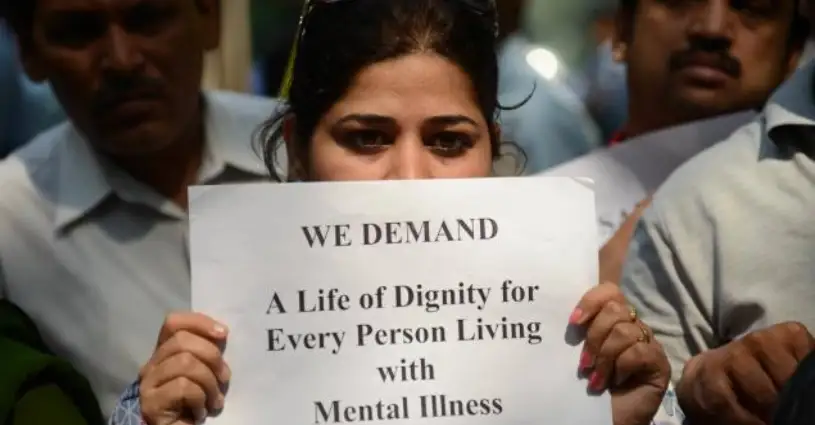"There is hope, even when your brain tells you there isn't." How well quoted by John Green, an American author, YouTuber, podcaster, and philanthropist.
Sometimes, in life, when you find yourself surrounded by a lot of negativity, you feel drowned in sadness and regret, drenched in tears, your brain might suggest that you are good for nothing and there's no way out of the way you feel, but, that's not how it is. There is always hope for better things in life. In today's busy lifestyle, where everyone is tirelessly hustling to live the life of their dreams, one often forgets to prioritise their mental health.
As stated by the World Health Organisation (WHO), "Mental health is a state of mental well-being that enables people to cope with the stresses of life, realise their abilities, learn well and work well, and contribute to their community. It is an integral component of health and well-being that underpins our individual and collective abilities to make decisions, build relationships, and shape the world we live in. Mental health is a basic human right. And it is crucial to personal, community and socio-economic development."
Since forever, it has been stated that "Health is Wealth." But health is not merely related to the physical well-being of a person. Infact, it is a state of physical, mental, and social well-being of a person. A person is not considered to be a completely healthy person if he/she merely has the absence of diseases or any sort of ailments.
If you're physically fit and you've maintained your body well enough but have neglected your mental and emotional health, you're still unhealthy. If you're not mentally in the right state of mind, you will not be able to think, feel, and act in a good way. Having a healthy mind is just as important as having a healthy body.
What causes mental health issues?
There is a wide range of causes and situations that can lead to the deterioration of a person's mental health. It depends on person-to-person how they take a particular circumstance, since, every person has a different thinking process. The following factors play a role in affecting a person mentally:-
- Childhood abuse, trauma, or neglect
- Social isolation or loneliness
- Experiencing discrimination and stigma, including racism
- Social disadvantage, poverty or debt
- Bereavement (losing someone close to you)
- Severe or long-term stress
- Having a long-term physical health condition
- Unemployment or losing your job
- Homelessness or poor housing
- Being a long-term carer for someone
- Drug and alcohol misuse
- Domestic violence, bullying or other abuse as an adult
- Significant trauma as an adult, such as military combat, being involved in a serious incident in which you feared for your life, or being the victim of a violent crime
- Physical causes – for example, a head injury or a neurological condition such as epilepsy
3 Lesser Known Mental Health Problems That Are Quite Common:
1) Schizophrenia:-
Schizophrenia is a serious mental health disorder that tends to affect the way a person thinks, acts, and reacts to certain situations. People suffering from this condition interpret reality abnormally, resulting in a combination of delusion (a false belief), hallucination (a perception of having seen, heard, touched, tasted, or smelled something that wasn't there), and thinking in a way that hinders with the daily functionality of a person.
People with this condition require lifelong treatment. Early treatment may help get symptoms under control before serious complications develop. In men, schizophrenia symptoms typically start in the early to mid-20s. In women, symptoms typically begin in the late 20s. It's uncommon for children to be diagnosed with schizophrenia and rare for those older than age 45.
2) Disruptive behaviour and dissocial disorders:-
Disruptive behavior disorders (DBD) refer to a group of conditions that typically share difficulties in modulating aggressive conduct, self-control, and impulsiveness. Problematic issues with self-control associated with these disorders are commonly first observed in childhood, but may often persist into adolescence and adulthood. The clinical management of DBD in childhood and adolescence has seen great advances in recent years, and research has also focused on identifying early signs, predictors, and risk factors. Children with these behavioral disorders can be stubborn, difficult, disobedient, and irritable.
3) Cotard’s Delusion:-
Discovered by a French Psychiatrist in 1880, Cotard’s delusion is one of the scariest mental illnesses that ever existed. It falls under the category of anxiety.
This is also known as the walking corpse syndrome where the sufferer believes that they are deceased, or dying and out of existence. Studies show that patients suffering from this disorder would refuse to eat or take medications. Some of them also have hallucinations, believing that they are already dead.
Cotard's syndrome exists in three stages:
- Germination stage: symptoms such as psychotic depression and hypochondria often appear;
- Blooming stage: full development of the syndrome and delusions of negation; and;
- Chronic stage: continued severe delusions along with chronic psychiatric depression.
How to improve your mental health?
Some measures that can be taken to take care of your mental health are:-
- Try to relax and reduce stress
- Find ways to learn and be creative
- Spend time in nature
- Connect with others
- Look after your physical health
- Try to improve your sleep
